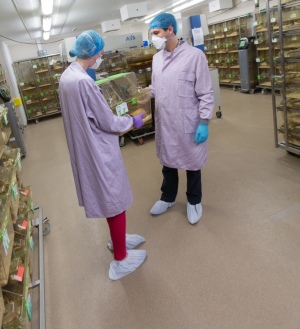New Director of Bioservices explains Imperial's approach to animal research
by Kerry Noble

Imperial has appointed Professor Marina Botto as its first Director of Bioservices to oversee animal care and animal research strategy at the College.
Professor of Rheumatology and Director of the Centre for Complement and Inflammation Research at Imperial, Marina Botto took up the new post in July this year.
Her research focuses on an autoimmune conditions called lupus and includes work with mice to understand how the disease develops.
“I’ve been working with animals in research for more than 15 years, my academic career is underpinned by this work. In taking on this role, I have the opportunity to give something back to the animal research community and I am fully committed to do so. Being an academic I know how important is to create the right environment for my colleagues and for the animals we work with,” Professor Botto said.

Imperial's Action Plan promotes stronger links between scientists and staff who look after animals
“Throughout my career at Imperial, I’ve taken a great interest in the way we carry out research involving animals – contributing to committees and more recently championing the College’s Action Plan.”
The new post was announced as a key element of the College’s Action Plan for animal research at the beginning of 2014.
The Action Plan was developed to support the high standards of animal care already in place at Imperial, and to continue to improve the management of animal research at the College.
Alongside creating the post of Director of Bioservices, the plan aims to promote stronger links between CBS staff who look after animals day-to-day and the scientific community. It also aims to help implement best practice in the ethical review process, increase communication, and promote the refinement, reduction and replacement of animals in research (the 3Rs).
Reflecting on her new role, Professor Botto said: “As Imperial’s animal research community, we have already made so much progress with implementing the Action Plan and I am very proud to have contributed, at least in part, to the changes. The thing that has impressed me so far is the high level of professionalism and collaboration by all people involved in animal research - from the staff who care for the animals to the academics who use animals in their research and the College leadership.”
She continued: “A new governance structure for animal research is already in place. My role now is to build on what we’ve already achieved to embed the ideas set out in the Action Plan into working practice and continue to promote the cultural change programme.
If we achieve the best standards in animal research then my colleagues can be open with the public
– Professor Marina Botto
“We are making gains in terms of the 3Rs and I am strongly committed to support and encourage this. We are fully dedicated to the best use of animal models of disease, for example by using the most advanced imaging technology such as MRI.”
Looking ahead, Professor Botto said: “I am also working on a long-term strategy for animal research at Imperial to ensure that our facilities remain of a very high standard and fit for purpose. This work isn’t something that will ever be complete - it’s a continuous process as best practice changes and the nature of research changes. I want to ensure we continue to provide facilities that have the best standards of welfare for our animals and can deliver the best science for our researchers. These will be the indicators of success.”
Finally, Professor Botto adds: “I will also be judged on openness. It’s been a year since we signed up to the UK Concordat on openness in animal research and, with the help and encouragement of our communications staff we have already been more open in digital and face-to-face communications. If we achieve the best standards in animal research then my colleagues can be open with the public about their work without fear, because they will have nothing to hide.”
Article text (excluding photos or graphics) © Imperial College London.
Photos and graphics subject to third party copyright used with permission or © Imperial College London.
Reporter
Kerry Noble
Department of Surgery & Cancer